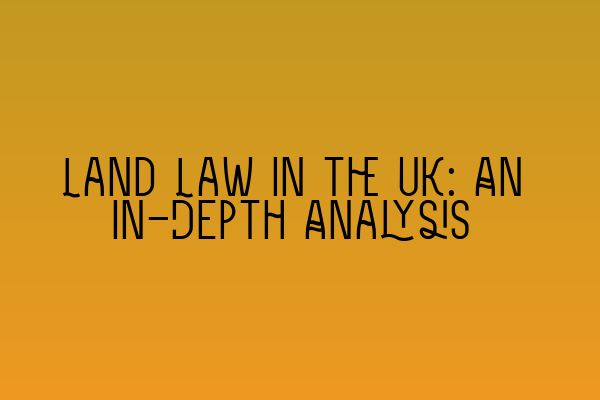Land Law in the UK: An In-Depth Analysis
Welcome to the SQE Property Law & Land Law blog! In this in-depth analysis, we will explore the intricacies of land law in the UK. Whether you are a student preparing for the SQE 1 exam or a legal professional seeking a deeper understanding of property law, this article will provide you with valuable insights.
Laying the Foundation: What is Land Law?
Land law is a branch of law that governs the rights, interests, and obligations associated with land ownership in the UK. It encompasses a wide range of legal principles and statutes that regulate the buying, selling, and usage of land.
To fully comprehend land law, one must familiarize themselves with essential concepts such as legal estates, equitable interests, and the Land Registration Act 2002. These foundational elements serve as the building blocks for understanding the more intricate aspects of this area of law.
Types of Estates and Interests
One key aspect of land law is the classification of estates and interests. Understanding the different types is crucial for interpreting property rights and obligations. In the UK, the two primary types of estates are freehold and leasehold.
– Freehold: A freehold estate grants the owner full ownership rights indefinitely. It is the highest form of estate ownership and provides the most extensive set of rights and powers.
– Leasehold: A leasehold estate, on the other hand, grants the holder a temporary interest in a property. It typically involves a lease agreement between the landlord (freeholder) and the tenant (leaseholder) and is subject to certain restrictions and conditions.
Within these estates, various interests can exist. These include legal interests, equitable interests, and certain rights enforceable against third parties. Understanding these interests is crucial for resolving any disputes related to land ownership.
Key Principles and Statutes in Land Law
Several essential principles and statutes form the foundation of land law in the UK. These include:
– The Law of Property Act 1925: This act consolidated various aspects of land law, providing a clear framework for the transfer and registration of land.
– The Land Registration Act 2002: This act introduced a compulsory registration system for land in England and Wales. It aims to simplify the process of determining legal rights over land.
– The Trusts of Land and Appointment of Trustees Act 1996: This act governs the operation of trusts related to land and provides mechanisms for resolving disputes and issues concerning trusts.
– The Landlord and Tenant Act 1987: This act regulates the relationship between landlords and tenants, ensuring fair practices and protecting the rights of both parties.
These statutes, along with other common law principles, govern various aspects of land law, including conveyancing, mortgages, easements, covenants, and adverse possession.
Resolving Land Disputes
Inevitably, disputes arise in land law cases. Some common disputes include boundary disputes, adverse possession claims, or disputes over the interpretation of covenants. When faced with such disputes, it is essential to understand the legal framework and procedures for resolving them.
In many cases, parties may seek resolution through negotiation, mediation, or arbitration. However, if no resolution can be reached, litigation may be necessary. In such instances, understanding the rules of evidence, court procedures, and remedies available is crucial to ensuring a successful outcome.
Conclusion
Land law is a vast and complex area of law that plays a fundamental role in property ownership and transactions in the UK. Whether you are pursuing a career in property law or simply seeking a deeper understanding of the subject, becoming well-versed in land law is crucial.
We hope this in-depth analysis has provided you with valuable insights into the intricacies of land law in the UK. If you are preparing for the SQE 1 exam, be sure to check out our related articles on SQE 1 Practice Exam Questions and SQE 1 Practice Mocks FLK1 FLK2. For comprehensive preparation courses, visit our pages on SQE 2 Preparation Courses and SQE 1 Preparation Courses. Stay updated with the latest SRA SQE exam dates by visiting SRA SQE Exam Dates.
Thank you for reading, and we hope you found this article informative and helpful. If you have any questions or need assistance with land law, the team at SQE Property Law & Land Law is here to help!
